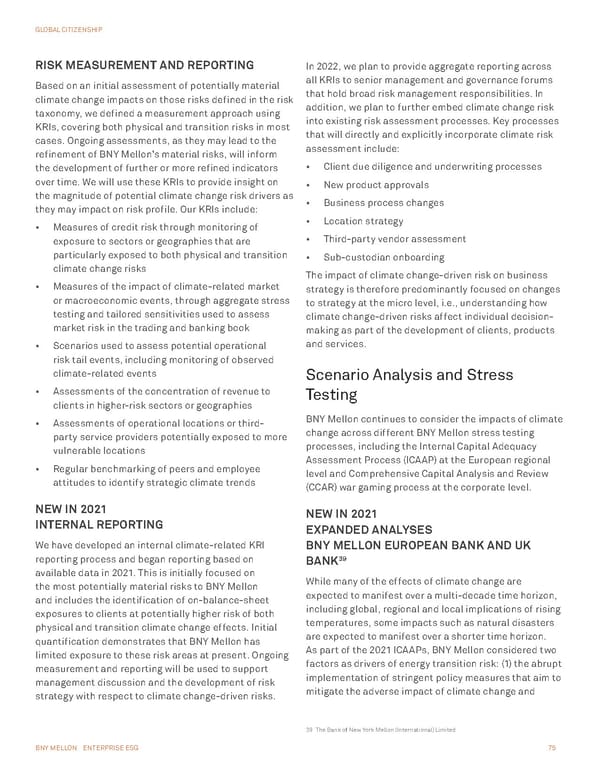BNY MELLON ENTERPRISE ESG 75 GLOBAL CITIZENSHIP RISK MEASUREMENT AND REPORTING Based on an initial assessment of potentially material climate change impacts on those risks defined in the risk taxonomy, we defined a measurement approach using KRIs, covering both physical and transition risks in most cases. Ongoing assessments, as they may lead to the refinement of BNY Mellon’s material risks, will inform the development of further or more refined indicators over time. We will use these KRIs to provide insight on the magnitude of potential climate change risk drivers as they may impact on risk profile. Our KRIs include: • Measures of credit risk through monitoring of exposure to sectors or geographies that are particularly exposed to both physical and transition climate change risks • Measures of the impact of climate-related market or macroeconomic events, through aggregate stress testing and tailored sensitivities used to assess market risk in the trading and banking book • Scenarios used to assess potential operational risk tail events, including monitoring of observed climate-related events • Assessments of the concentration of revenue to clients in higher-risk sectors or geographies • Assessments of operational locations or third- party service providers potentially exposed to more vulnerable locations • Regular benchmarking of peers and employee attitudes to identify strategic climate trends NEW IN 2021 INTERNAL REPORTING We have developed an internal climate-related KRI reporting process and began reporting based on available data in 2021. This is initially focused on the most potentially material risks to BNY Mellon and includes the identification of on-balance-sheet exposures to clients at potentially higher risk of both physical and transition climate change effects. Initial quantification demonstrates that BNY Mellon has limited exposure to these risk areas at present. Ongoing measurement and reporting will be used to support management discussion and the development of risk strategy with respect to climate change-driven risks. In 2022, we plan to provide aggregate reporting across all KRIs to senior management and governance forums that hold broad risk management responsibilities. In addition, we plan to further embed climate change risk into existing risk assessment processes. Key processes that will directly and explicitly incorporate climate risk assessment include: • Client due diligence and underwriting processes • New product approvals • Business process changes • Location strategy • Third-party vendor assessment • Sub-custodian onboarding The impact of climate change-driven risk on business strategy is therefore predominantly focused on changes to strategy at the micro level, i.e., understanding how climate change-driven risks affect individual decision- making as part of the development of clients, products and services. Scenario Analysis and Stress Testing BNY Mellon continues to consider the impacts of climate change across different BNY Mellon stress testing processes, including the Internal Capital Adequacy Assessment Process (ICAAP) at the European regional level and Comprehensive Capital Analysis and Review (CCAR) war gaming process at the corporate level. NEW IN 2021 EXPANDED ANALYSES BNY MELLON EUROPEAN BANK AND UK BANK 39 While many of the effects of climate change are expected to manifest over a multi-decade time horizon, including global, regional and local implications of rising temperatures, some impacts such as natural disasters are expected to manifest over a shorter time horizon. As part of the 2021 ICAAPs, BNY Mellon considered two factors as drivers of energy transition risk: (1) the abrupt implementation of stringent policy measures that aim to mitigate the adverse impact of climate change and 39 The Bank of New York Mellon (International) Limited
 BNY Mellon ESG Report Page 74 Page 76
BNY Mellon ESG Report Page 74 Page 76